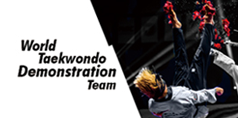It was the most heartbreaking fight of the 2015 World Taekwondo Championships.
In the semifinals of the male -58kg category, Russian Ruslan Poiseev had the home town crowd on his side - but all other odds were stacked against him. In a sport where tall, leggy fighters have the advantage, Poiseev, ranked 4th in the world, was at least a head shorter than his opponent, the world-ranked number one, Farzan Ashour Zadeh Fallah. Moreover, the “Iranian Tsunami” is perhaps the most dominant fighter in taekwondo today: He regularly sweeps championships and humiliates opponents by winning with maximum point differentials.
On paper, it should have been a wipeout. On the mats, Ashour Zadeh Fallah faced perhaps the most serious challenge to his crown.
Poiseev was totally unintimidated. Round 1 opened with the Iranian towering over his opponent and fighting with his perfected foot-fencing style. But it was Poiseev who took the first point with an earth-shaking punch. With Ashour Zadeh Fallah attempting to control the center of the ring, Poiseev who struck home a second time, with another punch. It was clear that the Russian was cancelling out the Iranian’s height advantage by taking the fight in to the ultra-close range – then “The Tsunami” struck back with a head kick, taking the score to 3-2. But Poisseev had come to fight, and racked up two more points, making it 4-3, before his opponent equalized it, 4-4.
Then, defying his height disadvantage, Poiseev rocked Ashour Zadeh Fallah with a head kick that brought the audience to its feet. Then yet another head shot from Poiseev connected, taking the score 7-4 to the diminutive Russian, Astonished by these out-of-nowhere kicks, the Iranian looked temporarily lost as his coach shouted advice. The fight descended into some messy clinchwork – the Poiseev scored yet again, with a body shot.
As the final round began, Poiseev was leading the scoring 10-6, but his opponent had got his second wind. Striking out with his heat-seeking front leg, Ashour Zadeh Fallah started racking up the points, taking the match to 11-11. In the final seconds it was all down to one point. It was the Iranian who struck first, taking the wining point with just two seconds left on the clock.
It was a brilliant comeback and a master performance by the Iranian phenomenum - but it was Poiseev’s smart tactics, bulldozer style and shear heart that won the crowd. And he is unfazed by the loss, setting his sights on 2016. "
I want to go to Rio,” he said. “I want to fight with the strongest.”
Poiseev’s team mates have given him an odd nickname. “When we are training, I never show my pain or talk about it, I always say ‘I am fine,’” he said. “So the lads say I am like a stone or a machine.”
That nickname and his never-say-die attitude may be in-built, for Poiseev hails from one of the most inhospitable urban environments on earth: the city of Yakutsk. Located about 450 kilometers south of the Arctic Circle, where the temperature can plummet to 70 degrees below zero, Yakutsk is known for its gold and diamond mines. It is also known for breeding some of Russia’s hardest men.
“This region I am from, fighting is very popular - boxing, taekwondo, wrestling, all kinds of fighting! - because genetically we are not very tall, but we are very well built,” he said. “I am from a region where it is tough. A lot of lads turn to crime.”
Of course, when it comes to a combat sport, this kind of background can be a plus. “My heart and my body work well under any kind of pressure, these good genes come from conditions of nature that a normal person cannot survive,” he said. “On the Russian team everybody asks, ‘In your region, is everybody wild like you?’”
As a youth, Poiseev hung around with a rough crowd. They would sample various sports and be kicked out for breaking rules. “We were very tight, very aggressive and we saw a lot of Van Damme and Jackie Chan films,” he recalled. When the crew heard that a new sport had come to town - something called “taekwondo” – they decided to give it a try.
After his first lesson, Poiseev found he could barely move. “I told my mom, ‘This is not for me!’” She told him to man up and give it another try - a piece of advice that would stick with the young man. “Now, in my character, it if is easy, I am not interested,” he said. “If it is very difficult, I am interested.”
Poiseev’s taekwondo club was so poor, there was only one dobok, which was passed from player to player; it was either too big or too small for most of them. When they entered their first competition, the dobok disappeared, so Poiseev, aged 12 and a beginner in taekwondo, asked to fight wearing only a T-shirt. He was allowed to, though his opponent was a black belt.
“When they warmed up, my opponent put his leg very high up, it was a big stress for me, my coach said, ‘Don’t look at him!’” he recalled. “I was very scared in my first fight, my opponent shouted and ran at me, so I just covered up and fired a back kick.” Poiseev counted one-two-three then looked around. His opponent was folded up on the floor, crying.
Poiseev went on to win second place in the competition. “I got the silver medal, so I carried it with me, on the buses and everywhere!” he said. He has been with the sport ever since.
Growing up in Yakutsk, he developed, because of his short stature, a personalized fighting style, based on head butts and shooting for the opponent’s legs. Now a full-time taekwondo athlete, he has developed his own unique style to deal with taller opponents. “When I was 17, I had a lot of questions about this and my coach could not answer all these questions,” he said - so he found his own.
He borrowed heavily from other sports. He has copied footwork from football, uses wrestling-style arm controls in the clinch, and boxing techniques when punching. He has also worked out how to kick high from very close range, cutting under his opponents’ legs.
He is no one-dimensional fighter. In 2009, he was invited by a judo coach to fight in a mixed martial arts tournament – which he won, despite being a complete unknown. He has also practiced boxing, and has been approached by professional football clubs. “The football coaches say, ‘You are not paid enough, taekwondo is not famous like football,’ but I said, ‘I have everything: I have a salary, a black belt and a degree in sport,'” he said. “I am devoted to taekwondo!”
After winning his medal in Chelyabinsk, he called his mother. She was in tears, cursing the judges. His father simply told him to come home. And what about his wild friends from his school days? “Some of them have a criminal background, but they are happy for me they read the newspaper and they support me,” he said.
So although he had to settle for bronze in the championships, Poiseev is grateful to taekwondo. “I am lucky I got into this sport,” he mused. “If I had not, I might have been a gangster.”




































